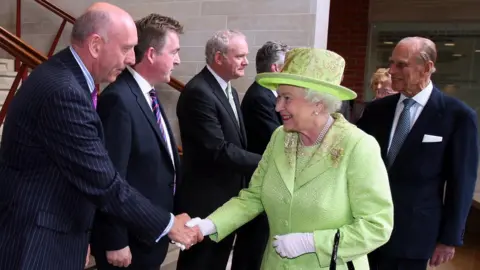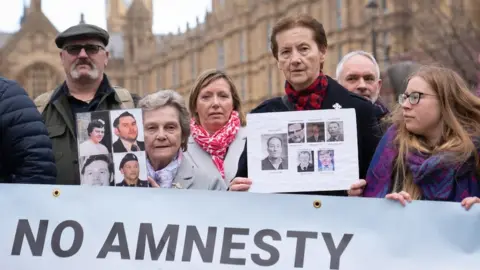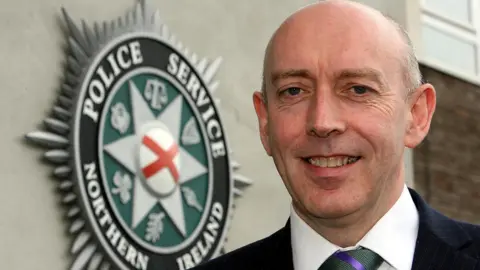Peter Sheridan: Ex-police commander to sit on Troubles body
 ICRIR
ICRIRFormer police commander Peter Sheridan has been appointed to the government's new £250m Troubles legacy body.
Mr Sheridan, who was the PSNI's highest ranking Catholic officer, is due to become commissioner of investigations on the Independent Commission for Reconciliation and Information Recovery (ICRIR) in December.
From May they will take over hundreds of unresolved Troubles cases.
It is understood Mr Sheridan - who organised the handshake between Queen Elizabeth II and former IRA commander and then Deputy First Minister Martin McGuinness in 2012 - will lead a team of investigators who will have the same powers as a police constable in reviewing cases.
Speaking after the announcement, Mr Sheridan said he was committed to carrying out his new role "without fear or favour".
"There is nothing I want more than to see people given the information and closure they need, using the full range of powers and tools that the commission will be able to bring to this work, so that we can all move forward together," he said.
"We may never forget the past, but I hope we will be able to focus on building an inspiring future together for Northern Ireland, for the sake of future generations."
 PA Media
PA MediaThe new body, which will employ several hundred people, is being set up under the government's legacy bill which passed its final hurdle in the House of Lords on Tuesday.
It is due to receive Royal assent in the coming weeks.
The bill will bring an end to Troubles-related inquests and civil cases, but victims' families have said it will also block their path to justice.
As part of an information recovery process, perpetrators will be offered immunity from prosecution if they share details of their crimes.
The new legacy body has been widely opposed by victims' groups, politicians and the Irish government and is expected to face legal challenges once the bill becomes law.
Who is Peter Sheridan?
Mr Sheridan, who is currently chief executive of peace-building charity Co-operation Ireland, served 32 years in both in the Royal Ulster Constabulary (RUC) and its successor the Police Service of Northern Ireland (PSNI).
He joined the RUC in the 1970s as a young, Catholic recruit at the height of the Troubles.
He reached the rank of assistant chief constable in the PSNI - the highest ranking Catholic officer - and was considered a future chief constable.
He survived several murder bids by the IRA.
On one occasion, two detectives were killed when a booby-trap bomb he was called to investigate exploded.
Gardaí (Irish police) also foiled an IRA bid to plant a bomb under his car while he attended Mass with his wife and children.
Despite the concerns of his family, he stayed with the job.
He was tipped to replace Sir Hugh Orde as chief constable but in 2008 he decided to swap policing for peace building.
He took charge of Co-operation Ireland and brought the cross-border charity to new heights.
 PA Media
PA MediaDuring his 15 years with Co-operation Ireland, he was heavily involved in cross-border peace building and played a key part in high-profile acts of reconciliation.
More recently he met loyalist paramilitaries to discuss their concerns over the Northern Ireland Protocol and Irish sea border.
Sir Declan, chief commissioner-designate, said the new appointment was a "significant milestone" in establishing the body.
"Peter brings a unique combination of professional investigative experience, a thorough appreciation of our context and an unrivalled track record of reaching across all aspect of our community," he said.

Analysis: No stranger to taking risks
You could say he became the face of reconciliation in Northern Ireland.
But Peter Sheridan worked most of the time below the public radar.
 PA Media
PA MediaHe once brought together an IRA man and the widow of the police officer he murdered.
The IRA man had asked for the meeting and the widow accepted.
Mr Sheridan sat with the pair for more than two hours as they talked about what happened.
He was then asked to leave as the pair embraced.
That experience, says Mr Sheridan, stayed with him and is one of the reasons why he feels the approach the government is now taking will work for some families.
But he will be tested like never before in his new role.
His credibility and track record when it comes to reconciliation will only carry him so far when faced with families furious with the government for crushing their hopes of justice.
Though Mr Sheridan will say prosecutions are still possible, in truth they are unlikely to happen.
Instead, he will spend his time collecting as much information as possible for families about the murder of their loved ones.
That process may involve the murderer providing the information in exchange for immunity from prosecution.
It will be a process fraught with raw emotion and many challenges.
Peter Sheridan's life will not be at risk in this job, but his own legacy might be.
